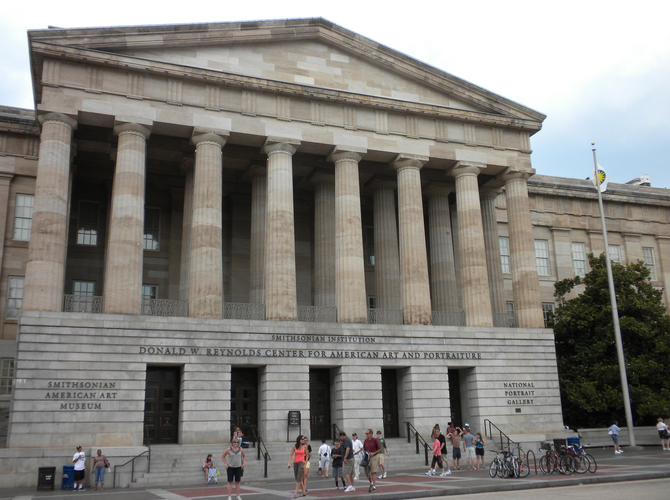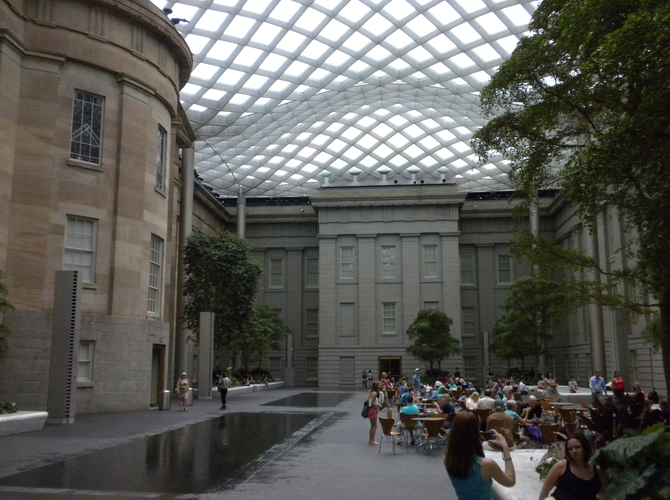Smithsonian American Art Museum
What is the American Art Museum?
The Smithsonian Institution's American Art Museum is the nation's oldest collection of American Art, with a collection representing over 7000 american artists. The Museum shows off the variety in style, region, and culture that can be found in the country. The museum shares space in one of Washington, DC's oldest public buildings with the National Portrait Gallery. Some of the collection is additionally shown in the Rewick Gallery.
What Highlights can be found at the American Art Museum?
The museum contains many pieces from each of the following categories:
-
Early America: Artwork from the original european colonies and early United States are on display, and depict the history of the nation and its people. The collection includes some seventeenth century works, and includes a portrait Mrs. George Watson, depicting the clothing of the period as displayed by the wife of a Boston importer.
-
Nineteenth-Century Art: As the nation expanded it was documented by artwork in the Hudson River School style, capturing the grand landscapes of the country. Alongside this, the collection captures the impressionism and Guilded Age works of the century.
-
Twentieth-Century Art: The twentieth-century moved toward a preference for the conflicting realism and abstraction styles. The collection includes many examples of each as they capture the changing pre and post-war nation, and the influence of jazz and experimentation.
-
African American Art: The American Art Museum's more than 2000 pieces by African American artists depict the lifestyle and culture of African Americans as the nation progressed through the years. Many focus on the South, the Great Migration, Harlem, and the Jazz Age.
-
Craft: The collection includes jewelry, studio furniture, and wood carvings and art created by american and colonial artists are featured in the museum.
-
Folk and Visionary Art: Overlooked by some, the American Art Museum features the art of those americans who had no formal art training, but much of which has had significant importance.
-
Latino Art: The museum collects works by latino artists in the United States and the Americas, representing the significant impact of latino culture and artwork in the nation.
-
Photography: Much of America's history has been documented by the photograph, and photography has long been part of the art in America's culture.
-
Sculpture: The museum features one of the largest collections of sculptures by american artists in the world, featuring works from the nineteenth-century to today.
-
Works on Paper: The collection includes prints and drawings by many prominent US artists, including John James Audubon, including nineteenth, twentieth, and modern artists.
The museum also runs special exhibitions throughout the year. For a current listing, see the museum's listing of current exhibitions.
What else is at the American Art Museum?
The Smithsonian American Art Museum is shared with the National Portrait Gallery. The building is also home to the Kogod Courtyard, an indoor courtyard which serves as casual public dining space and concert venue. The space hosts Take 5!, a free jazz concert, every third Thursday, and the Steinway Series, a classical music concert, the second Sunday of each month.
When is the American Art Museum Open?
- The Smithsonian American Art Museum is open daily from 11:30 a.m. to 7 p.m.
- Closed December 25
Where is the American Art Museum?
The American Art Museum is located in the block between F and G St NW, and 7th and 9th St NW in Washington DC's Downtown. The building is a few blocks north of the National Mall, and east of the White House, across the street from DC's Verizon Center.
What metro station is closest to the American Art Museum?
All metro lines provide easy access to the museum:
- Gallery Place Station is across the street (Red Line, Green Line, Yellow Line)
- Metro Center Station a couple blocks from the museum (Blue Line, Orange Line, Silver Line)
What does it cost to visit the American Art Museum?
As with other Smithsonian Institution museums and galleries, there is no cost for admission to the National Air and Space Museum.
Where can I learn more about the American Art Museum?
Learn more at http://americanart.si.edu/.

